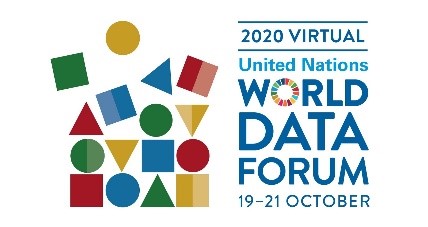By Jane Lyon Lee, IPUMS International
Last March, when the IPUMS International research team attended the 51st Meeting of the UN Statistical Commission, we were just beginning to hear about the spread of a novel virus. We soon discovered that the Commission meeting would be our last in-person event of the year. Soon after, a pandemic quickly paralyzed our world, including the ever-important census and survey work. We all were called on to seek out and, in some cases, create new paths via which data collection, protection, analysis, and dissemination could continue.
 By autumn of 2020, international and regional agencies were leading the charge—taking bold actions to keep the data community connected. October 19-21, IPUMSI participated in the first-ever virtual UN World Data Forum at which we hosted a virtual exhibit and held virtual “open houses” which provided IPUMS staff. Our participation in a session about data dissemination partnerships, organized by Open Data, would be delayed until we could resume in person meetings on the Road to Bern.
By autumn of 2020, international and regional agencies were leading the charge—taking bold actions to keep the data community connected. October 19-21, IPUMSI participated in the first-ever virtual UN World Data Forum at which we hosted a virtual exhibit and held virtual “open houses” which provided IPUMS staff. Our participation in a session about data dissemination partnerships, organized by Open Data, would be delayed until we could resume in person meetings on the Road to Bern.
 The virtual conference momentum blossomed. The 30th Population Census Conference that had been delayed indefinitely, opened with live meetings. Sponsored by the Association of National Census and Statistics Directors of America, Asia and the Pacific (ANCSDAAPP) and the National Statistics Office of Mongolia, this typically smaller gathering of national statistical office representatives from the region proved to be welcoming and interactive. IPUMS International’s Sula Sarkar presented “IPUMS International: Extending the value of census data by promoting research” as part of a panel focused on Data Analysis and Utilization.
The virtual conference momentum blossomed. The 30th Population Census Conference that had been delayed indefinitely, opened with live meetings. Sponsored by the Association of National Census and Statistics Directors of America, Asia and the Pacific (ANCSDAAPP) and the National Statistics Office of Mongolia, this typically smaller gathering of national statistical office representatives from the region proved to be welcoming and interactive. IPUMS International’s Sula Sarkar presented “IPUMS International: Extending the value of census data by promoting research” as part of a panel focused on Data Analysis and Utilization.
 December continued to be a busy month of activity—and thanks to the virtual settings, IPUMS was able to sponsor, support, and participate in both the IUSSP Population and Poverty Conference and the Latin America Population Congress (ALAP). IPUMS sponsored 16 national statistical office delegates from Chile, Colombia, Ecuador, Bolivia, and Mexico to participate in all ALAP conference activities as well as in census and labor force survey-specific conversations (respectively) with each other to exchange experiences and challenges. We are grateful for these partners and their continued commitment to make their data available to the global research community.
December continued to be a busy month of activity—and thanks to the virtual settings, IPUMS was able to sponsor, support, and participate in both the IUSSP Population and Poverty Conference and the Latin America Population Congress (ALAP). IPUMS sponsored 16 national statistical office delegates from Chile, Colombia, Ecuador, Bolivia, and Mexico to participate in all ALAP conference activities as well as in census and labor force survey-specific conversations (respectively) with each other to exchange experiences and challenges. We are grateful for these partners and their continued commitment to make their data available to the global research community.

Eagerly anticipating success in the fight against the COVID-19 virus, we are looking forward to seeing our research community colleagues, data producing partners, and other members of the international official statistical community–in-person.
